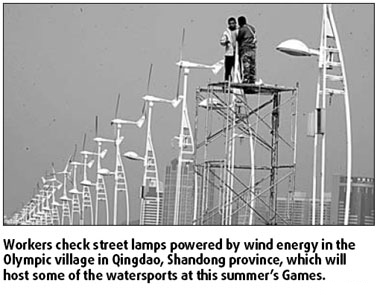The traditional Chinese spectacle of fireworks displays will light up Beijing the night of the Olympics' opening ceremony - but the surrounding air will remain relatively clear thanks to highly advanced pyrotechnics.
Fireworks with magnetic valves to control explosions of compressed air will produce just 20 percent of the smoke emitted from traditional chemical blasts, according to information released yesterday by the office of the Hi-Tech Olympic Games Action Plan.

"The whole process will not generate strong and smelly smoke," Yang Chunyi, head of the technology department of the Beijing Organizing Committee for the 2008 Olympic Games, said of the green innovation in store for August 8.
"It is not only safe and environmentally friendly, but also can result in a better picture presentation for both television and photography."
From fireworks to clean-fuel transportation, the Games will use a host of cutting-edge technologies and environmental measures to ensure a clean and green games, technology authorities told a press conference held by the State Council Information Office.
According to Wan Gang, minister of science and technology, new technologies have been developed to meet the scientific and technological demands of large-scale events, venue building and competition organization directly related to the Games.
For instance, a food tracing system will be in place for the safe transportation of products destined for the Olympics, Wan said .
Included in the system are bar codes, which act as 'identity cards' for vegetables and livestock.
By scanning them at supermarkets or by using mobile phones and the Internet, both authorities and the public will have access to information on the production area, date, producer, brand and source of the goods.
"We had a trial of the food- produce tracing system at the 2007 Special Olympics World Summer Games in Shanghai," Wan said. "It was a success."
Wan also said that some 500 clean-fuel vehicles, including 50 electric buses, 400 venue-based and 15 electric cleaning vehicles, will be used during the Games.
Relevant departments were working to have another 105 hybrid vehicles and 23 fuel cell cars and buses ready in time, he said.
The vehicles will continue to run as a demonstration project after the Games, he said.
Cleaner transportation forms, especially highly advanced hybrids, will soon arrive in other cities, he added.
In a more traditional green approach, solar, wind and geothermal power will also be used at venues and other Olympic-related buildings, Wan said.
Some 80 percent of rainwater will be collected and 100 percent of grey water - non-sewage or non-industrial use waste water - will be reused at various sites, he said.
This summer's Beijing Olympics will be "basically" carbon neutral thanks to a series of energy-saving measures, he said.
The event is expected to generate 1.18 million tons of carbon, in part because so many athletes and spectators will travel vast distances.
But the figure would be offset by a 1-1.29 million-ton reduction as a result of the measures, he said.
"We can basically ensure that emissions will be balanced," he said.
(Xinhua News Agency May 9, 2008)